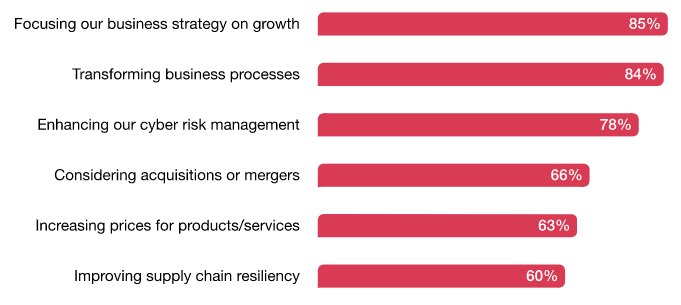COVID-19 may have gone the way of a pandemic, but uncertainty remains the norm in 2023. Be it the geopolitical tension in many parts of the world, the prevailing volatility of energy prices, or the looming crisis that is climate change, there is no rest for the CFO when it comes to navigating the challenges, man-made or otherwise. This is evident in the 47% of CFOs participating in the PwC Pulse Survey of August 2023 who say their top priority is building predictive models and scenario analysis capabilities.
The talent challenge is now becoming a table stake for all leaders, with 55% of respondents to the same PwC Pulse Survey acknowledging this as a serious business risk, 78% that plan to enhance their cyber risk management, and 42% who want to see accountability for climate change governance being assigned to a person-in-charge.
Redefining resilience for the modern-day CFO
According to Martim Rocha, global director of risk business consulting at SAS Institute, CFOs are bulwarks against unexpected events or disruption, while championing business continuity and profitability.
He points out that CFOs play a crucial role in ensuring company resilience, as they oversee financial planning, managerial and regulatory reporting.

"Even if they don’t have Risk Management under them (although in some cases they do), they contribute to identifying and assessing risks, evaluate the company's risk appetite, and implement risk management strategies that align with the company's overall goals and objectives."
Martim Rocha
He points out that this requires teamwork with the chief risk officer (CRO) to proactive approach to risk management, invest in advanced risk management tools, and establish a culture of integrating finance and risk management. By being more risk aware, the CFO can assess scenarios relevant to the firm's business strategy.
Evaluating organisational priorities that enhance resilience
Given the role of the CFO as partner, adviser and strategist to the CEO, the Board and the company, how should the CFO evaluate (or re-evaluate) the organisation's priorities to enhance its resilience?
To this question, Rocha suggests the CFO evaluate the organisation's priorities through the lens of integrated risk in finance management and resilience. "This includes identifying and addressing key risks, ensuring adequate resources are allocated to risk management efforts," he adds. "A key aspect in this is effective communication about resilience posture and collaboration – especially with the CRO."
He posits that the CFO can boost the organisation's resilience by ensuring balance sheets incorporate risk data, driving home the importance of budgeting and forecasting that is accountable to shareholders, and effectively managing staff to fulfil the tactical demands placed on finance.
Lessons from the pandemic
Rocha says the pandemic exposed businesses to the realities of more debilitating disruptions, with plenty of takeaways for CFOs. He points to the relative speed at which the crisis highlighted how quickly market drivers can change, making scenario planning and stress testing a critical tool to build the right balance between cash reserves and investments.
"The fact that the pandemic was one of several challenges occurring concurrently, underscored the need for CFOs to take a considered approach to investments, and in particular, their tech spends. Ultimately, best-fit technologies that are tailored to business demands are crucial, and CFOs must understand deeply how this tie in with a flexible and adaptable risk management strategy," he opines.
Lessons from the SVB failure
Before its collapse, the Silicon Valley Bank (SVB) financed about half of all U.S. venture-backed technology and healthcare companies. Startups flocked to SVB because not all banks are willing to take the higher risks associated with startups.
Rocha opines that SVB didn’t anticipate the combined shocks from interest rates and liquidity risks that they were vulnerable to. "It is now quite apparent that SVB’s downfall was born out of inadequate liquidity risk management practices," he puts forward. "This serves as a cautionary tale about the importance of maintaining strong risk management practices and a risk-aware culture throughout the organisation," he explains.
"CFOs must prioritise regular assessments of risks and vulnerabilities, as well as proactive measures to address those risks. Through an integrated approach that enables monitoring and orchestrating, CFOs will be able to lead efforts to enhance key processes like budgeting and stress testing."
Digitalisation is moving forward
Among participants in the PwC Pulse Survey, 85% said growth is the clear priority for 2023, and neither the uncertainties nor the threat of a US-led global recession will stop the march forward. Similarly, investments that form part of business transformation will continue according to 84% of the same PwC survey.
CFOs: Possible recession not hindering growth strategies

Asked what considerations CFOs will likely include as part of their return to business-as-usual goals, Rocha believes it is essential that resilience be factored into decision-making processes, regardless of whether it is concerning technology investments or other business objectives.
"CFOs must take control of the narrative and make the case for investments in cybersecurity, data privacy, and risk management tools," he adds. "It is critical that CFOs lead efforts to build a culture of risk awareness and agility throughout the organisation."
Rocha concludes that CFOs must also advocate for deep granularity over risk management to enable trend spotting that empowers adaptability and future readiness in the face of tricky conditions.




